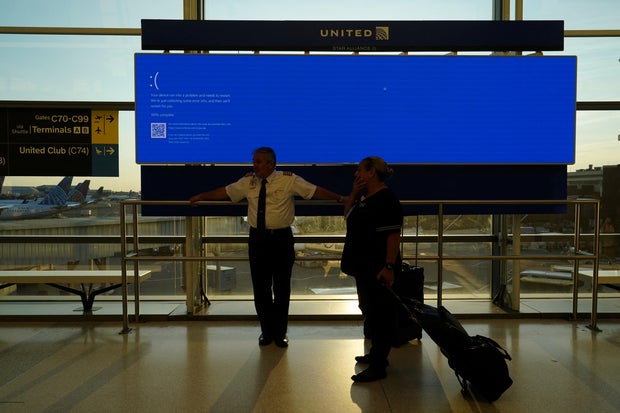Banks, airlines, television networks and health systems around the world that rely on Microsoft’s 365 apps reported widespread outages Friday. Thousands of flights and train services were cancelled in the U.S. and Europe and there were disruptions to many other public and retail services.
Here’s what we know about the outages:
What caused the global outages?
The issue was cause by a technical problem that global cybersecurity firm CrowdStrike said it had identified in its software and was working to resolve.
When CBS News called CrowdStrike’s technical support line on Friday, a pre-recorded message said the company was aware of reports of crashes on Microsoft systems related to its Falcon Sensor software.
In a statement shared Friday with CBS News and on social media, CrowdStrike CEO George Kurtz said the issue had been identified and a solution was being implemented.
“CrowdStrike is actively working with customers impacted by a defect found in a single content update for Windows hosts. Mac and Linux hosts are not impacted,” Kurtz said. “This is not a security incident or cyberattack. The issue has been identified, isolated and a fix has been deployed.”
What has been affected by the outages?
Over 600 flights had been cancelled in the U.S. by early Friday morning and more than 1,200 others were delayed. Globally, more than 15,000 flights were delayed early Friday, and that number was expected to rise.
American Airlines, Delta, United Airlines and Spirit Airlines grounded all pending flight departures, though American Airlines and United lifted their ground stops later Friday morning.
“We are resuming some flights but expect schedule disruptions to continue throughout Friday,” United Airlines said in a statement.
In Europe, Lufthansa, KLM and SAS Airlines reported disruptions. Switzerland’s largest airport, in Zurich, said planes were not being allowed to land, according to CBS News partner network BBC News.
In India, at the country’s primary airport in Delhi, everything was being done manually. No electric check-in terminals were functioning and gate information was being updated by hand on a white board, the BBC reported.
Bing Guan/REUTERS
Hospitals in Germany said they were cancelling elective surgeries Friday and doctors in the U.K. said they were having issues accessing their online booking system. Pharmacists in the U.K. said there were disruptions with medicine deliveries and accessing prescriptions.
Britain’s Sky News and the BBC’s TV network aimed at children both went off the air on Friday, though Sky came back up — with presenters reading from printed notes rather than off of teleprompters as they normally would.
When will the outages be fixed?
New Zealand’s acting prime minister David Seymour said on social media that officials were working hard to understand the impacts of the wide-ranging outages.
“I have not currently received any reporting to indicate these issues are related to malicious cyber security activity,” Seymour said.
A spokesman for Germany’s interior ministry also said there was no indication that the outages were due to a cyberattack, Reuters reported.
But even with the fix being implemented by CrowdStrike, some of the problems caused will likely take time to fix, Chief Information Officer at identity security firm CyberArk, Omer Grossman, told Reuters. He said the reason for this is that the problem has to do with Endpoint Detection and Response (EDR) products that run on individual client computers.
“It turns out that because the endpoints have crashed — the Blue Screen of Death — they cannot be updated remotely and the problem must be solved manually, endpoint by endpoint. This is expected to be a process that will take days,” Grossman said.
This is a developing news story and will be updated.





